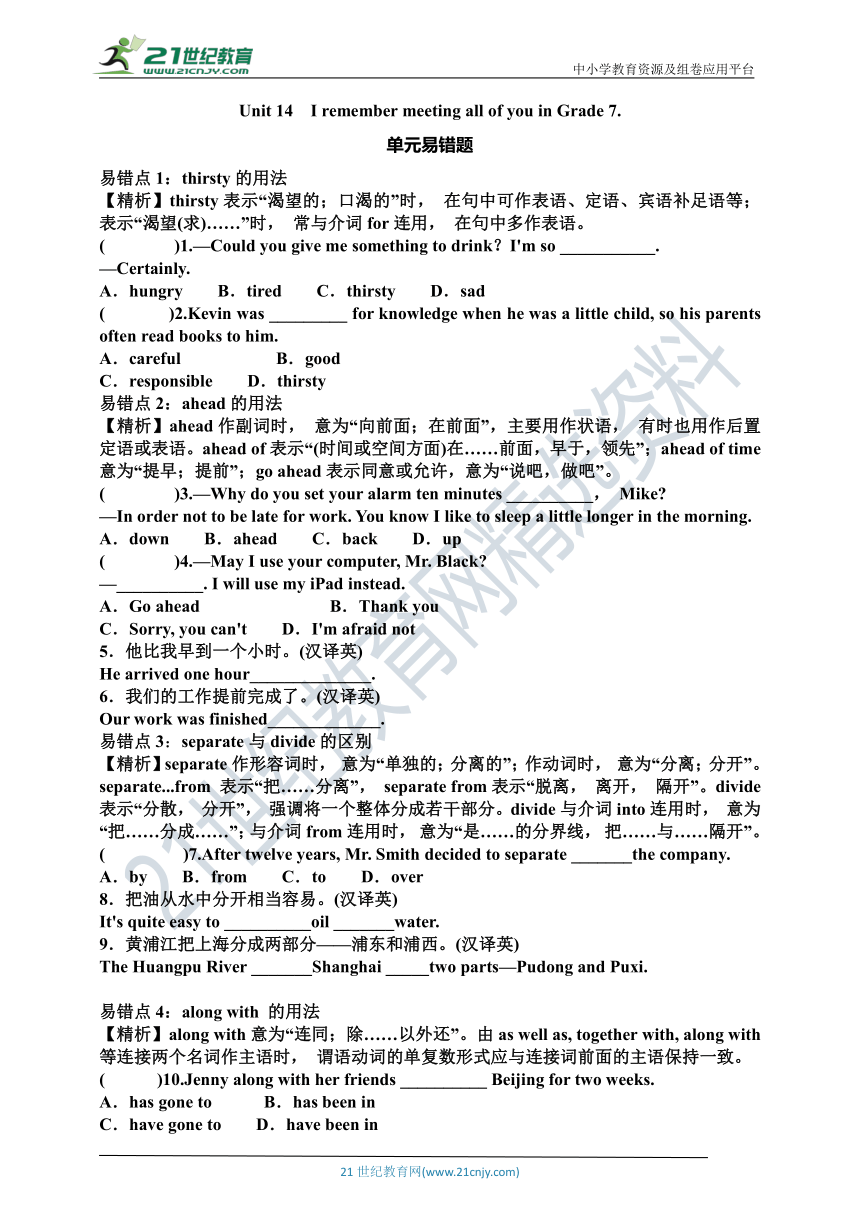
中小学教育资源及组卷应用平台 Unit 14 I remember meeting all of you in Grade 7. 单元易错题 易错点1:thirsty的用法 【精析】thirsty表示“渴望的;口渴的”时, 在句中可作表语、定语、宾语补足语等;表示“渴望(求)……”时, 常与介词for连用, 在句中多作表语。 ( )1.—Could you give me something to drink?I'm so _____. —Certainly. A.hungry B.tired C.thirsty D.sad ( )2.Kevin was _____ for knowledge when he was a little child, so his parents often read books to him. A.careful B.good C.responsible D.thirsty 易错点2:ahead的用法 【精析】ahead作副词时, 意为“向前面;在前面”,主要用作状语, 有时也用作后置定语或表语。ahead of表示“(时间或空间方面)在……前面,早于,领先”;ahead of time意为“提早;提前”;go ahead表示同意或允许,意为“说吧,做吧”。 ( )3.—Why do you set your alarm ten minutes _____, Mike? —In order not to be late for work. You know I like to sleep a little longer in the morning. A.down B.ahead C.back D.up ( )4.—May I use your computer, Mr. Black? —_____. I will use my iPad instead. A.Go ahead B.Thank you C.Sorry, you can't D.I'm afraid not 5.他比我早到一个小时。(汉译英) He arrived one hour_____. 6.我们的工作提前完成了。(汉译英) Our work was finished_____. 易错点3:separate与divide的区别 【精析】separate作形容词时, 意为“单独的;分离的”;作动词时, 意为“分离;分开”。separate...from 表示“把……分离”, separate from表示“脱离, 离开, 隔开”。divide表示“分散, 分开”, 强调将一个整体分成若干部分。divide与介词into连用时, 意为“把……分成……”;与介词from连用时, 意为“是……的分界线, 把……与……隔开”。 ( )7.After twelve years, Mr. Smith decided to separate _____the company. A.by B.from C.to D.over 8.把油从水中分开相当容易。(汉译英) It's quite easy to _____oil _____water. 9.黄浦江把上海分成两部分———浦东和浦西。(汉译英) The Huangpu River _____Shanghai _____two parts—Pudong and Puxi. 易错点4:along with 的用法 【精析】along with意为“连同;除……以外还”。由as well as, together with, along with等连接两个名词作主语时, 谓语动词的单复数形式应与连接词前面的主语保持一致。 ( )10.Jenny along with her friends _____ Beijing for two weeks. A.has gone to B.has been in C.have gone to D.have been in 11.Professor Smith, along with his assistants, _____(go) to the office at seven every day. 12.Tony, along with three other players, _____(kick) off the football team. 易错点5:out相关短语的辨析 【精析】set out意为“出发;启程”;相当于set off;put out意为“扑灭”;give out意为“散发;分发”;hand out意为“分发;派送”;work out意为“解决, 算出”;come out意为“出版, 出现, 开花”;run out意为“用尽;耗尽”;look out意为“小心”;find out意为“查明”。 ( )13.People now in many big cities have to _____ early to avoid the heavy traffic in the morning. A.set out B.put out C.take out D.give out ( )14.These new types of energy cost very little and will never _____. A.look out B.come out C.run out D.stay out ( )15.We need to do some research to _____the answer. A.find out B.look out C.hand out D.take out ( )16. ... ...
~~ 您好,已阅读到文档的结尾了 ~~